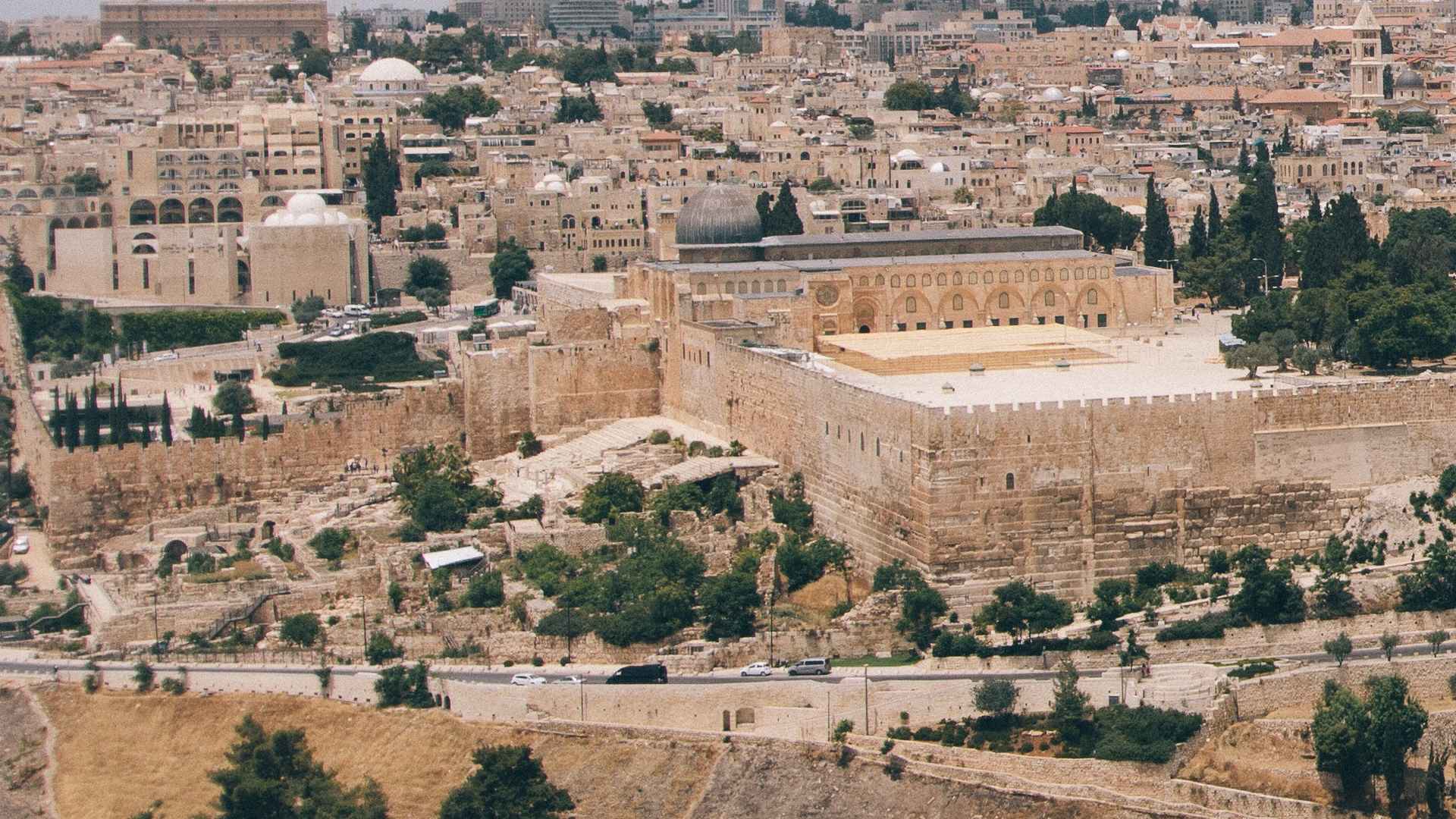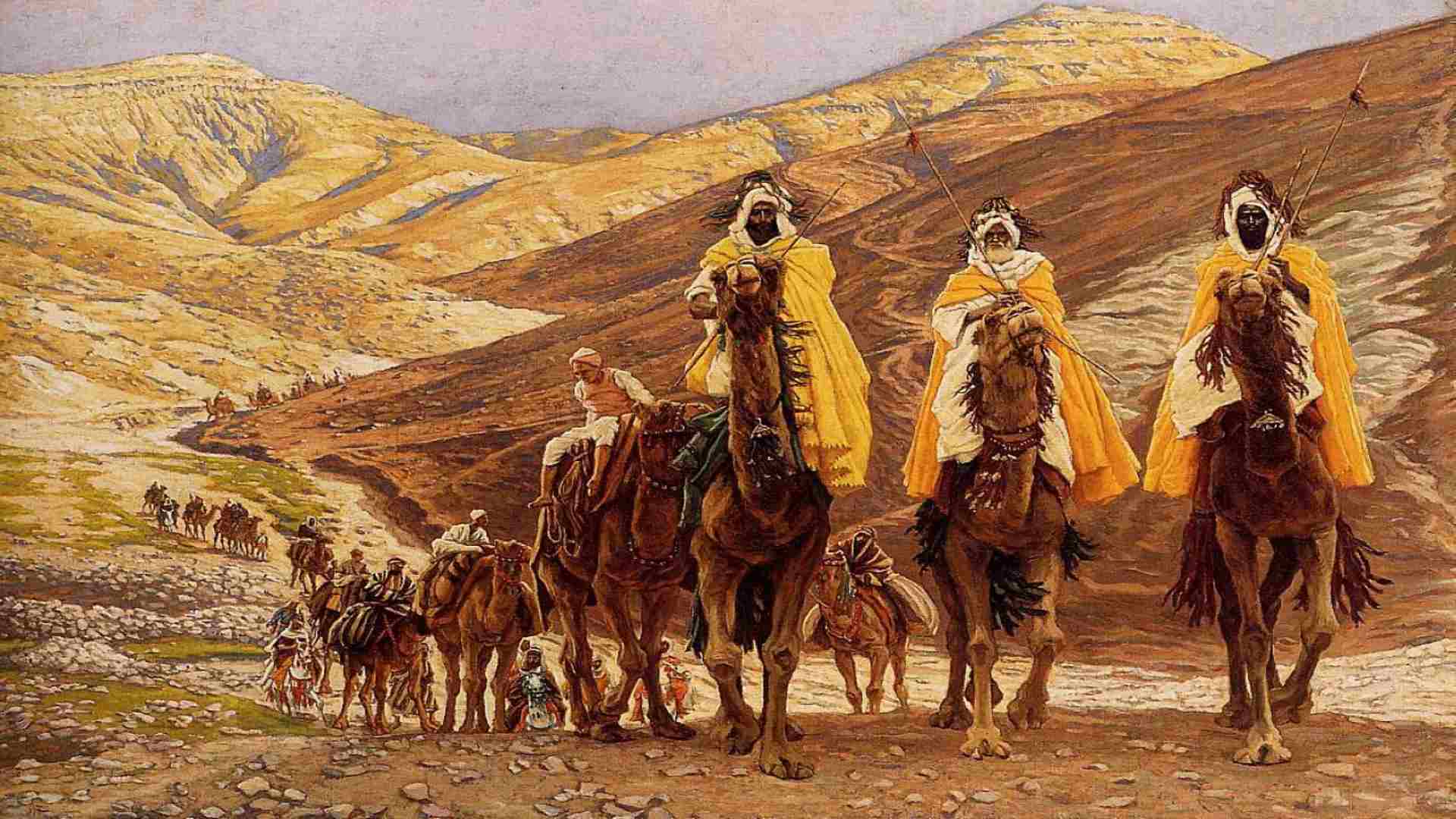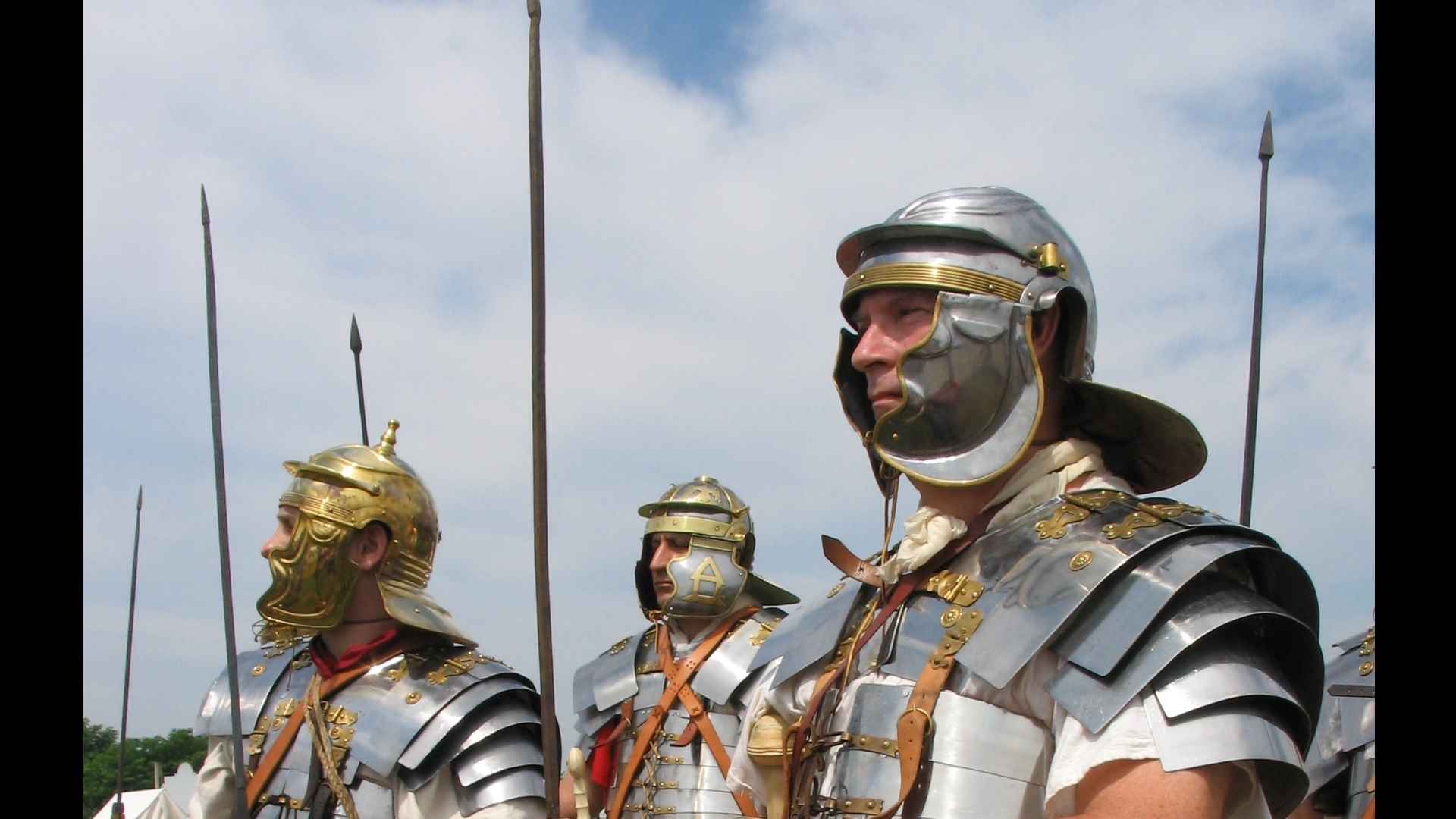A Christmas Scandal in Jerusalem!
[NOTE: Through-out the text you will bracketed green text insertions that begin with the word “Discussion”. These are suggested discussion questions for interactive group settings.]

Sermon: On a day much like this, approximately 2024[1] years ago, things were anything but peaceful in Jerusalem. The half a million or so inhabitants were on a knives edge. They were troubled! What was troubling them? Did it have to do with the mysterious visitors, from a far-off land, who after a long and difficult journey had suddenly ridden into the city?

The day had started out as relatively normal, until the soldiers tasked with controlling the city gates and keeping the peace, saw a group of foreign dignitaries and their entourage descending upon the city. Immediately upon arrival, this group of important looking foreigners with funny looking hats, started asking the people of Jerusalem about a newly born king of the Jews. Naturally, this caused some commotion, to say the least!

Soon enough this news also traveled to the ears of the current king living in Jerusalem, Herod the Great. “Hey Herod, there’s an impressive bunch of dignitaries from the east asking about a newly born king of the Jews, do you know anything about that?”. He didn’t, nor did he have any newborn sons. What in the world was going on?

Interestingly, 2024 years later, after this troubling day in Jerusalem, this very same event is causing commotion all over the world. Furthermore, just as back then, people today are still reacting in one of three ways: With great joy, apathy, or hostility.
What is this news that was so divisive then and so divisive now, news, which causes such opposite reactions? It’s the news that we celebrate every year during Christmas, which comes from the term “Christ’s Mass”.[2] Let’s shed some light into this matter by reading today’s text from Matthew 2:1-12.[a]
Matt. 2:1 Now after Jesus was born in Bethlehem of Judea in the days of Herod the king, behold, wise men from the east came to Jerusalem,
Matt. 2:2 saying, “Where is he who has been born king of the Jews? For we saw his star when it rose and have come to worship him.”
Matt. 2:3 When Herod the king heard this, he was troubled, and all Jerusalem with him;
Matt. 2:4 and assembling all the chief priests and scribes of the people, he inquired of them where the Christ was to be born.
Matt. 2:5 They told him, “In Bethlehem of Judea, for so it is written by the prophet:
Matt. 2:6 “‘And you, O Bethlehem, in the land of Judah, are by no means least among the rulers of Judah; for from you shall come a ruler who will shepherd my people Israel.'”
Matt. 2:7 Then Herod summoned the wise men secretly and ascertained from them what time the star had appeared.
Matt. 2:8 And he sent them to Bethlehem, saying, “Go and search diligently for the child, and when you have found him, bring me word, that I too may come and worship him.”
Matt. 2:9 After listening to the king, they went on their way. And behold, the star that they had seen when it rose went before them until it came to rest over the place where the child was.
Matt. 2:10 When they saw the star, they rejoiced exceedingly with great joy.
Matt. 2:11 And going into the house they saw the child with Mary his mother, and they fell down and worshiped him. Then, opening their treasures, they offered him gifts, gold and frankincense and myrrh.
[Discussion: What is Matthew’s objective in writing about these specific events? What is his main thrust?]
Matthew’s main objective is to present Jesus Christ as a king and to give a foretaste as to how his ministry would be perceived later on in life, accepted by some, gentiles in particular, and mainly rejected by those who thought themselves to be the most religious of all.
Through these verses Matthew tells us, that the king of the Jews, Messiah, the Savior, Christ Jesus, was born in Bethlehem, just as the prophet Micah predicted in the Old Testament several hundred years earlier. Furthermore, right from his very birth, giving a foretaste of his ministry later on in life, Christ Jesus provoked a range of emotions, from great joy to apathy to downright hostility. So, it is also today, 2024 years later. The question is, with which group do you have similarities with? Perhaps it’s a mix?

[Discussion: What are you looking forward to learning about tonight? Did you make any interesting observations in the verses we read?]
Tonight, whether you are far away from God, like the wise men were from Jerusalem, or think of yourself as close to knowledge and religion, like the priests and scribes, join me as we let the light of God’s word guide us to Jesus, just as the star guided the wise men on that dark night on their way to Bethlehem.
On our journey, let us gather wisdom from the wise men and be reminded and encouraged to follow the guiding star God has placed inside every Christian, the Holy Spirit. Tonight, he will not only help us navigate to Bethlehem with the wise men, but also remind us how to navigate daily life in our fallen bodies with-in this fallen world, until the day of our resurrection, made possible by the birth, life, death, and resurrection of our Lord and Savior Christ Jesus, king of the Jews and the world!
Seek and You shall Find
Matt. 2:1 Now after Jesus was born in Bethlehem of Judea in the days of Herod the king, behold, wise men from the east came to Jerusalem.
Matt. 2:2 saying, “Where is he who has been born king of the Jews? For we saw his star when it rose and have come to worship him.”

[Discussion: What caught your attention in these first two verses?]
Some time after Jesus was born, wise men from the east came to Jerusalem. I say some time, because as you may have noticed from verse 11, Jesus was no longer in a manger, but in a house: “And going into the house they saw the child”.[3]
[Discussion: Who were these wise men? Were they simply men with above average intelligence: “wise men”?]
No. The term “wise men” is “Magi” in the original language and it is a name of a tribe of people. Kind of like the Levites of Israel the Magi were a priestly tribe that had religious and political prominence in their homeland, which was likely around Babylon.[4] Since they were advisors to various kings and rulers, they were known as “wise men”. The Magi tribe were known as experts in a blend of astronomy. astrology, interpretation of dreams,[5] and sorcery.
[Discussion: Can you guess what modern English language word is derived from the word Magi?]
This is where we get the word “magic” from.
[Discussion: Going back several centuries before the birth of Jesus, do you remember who was the chief of all the Magi, the wise men, in the Babylonian empire, under the reign of king Nebuchadnezzar?]
Dan 2:48 Then the king gave Daniel high honors and many great gifts, and made him ruler over the whole province of Babylon and chief prefect over all the wise men of Babylon.
That’s right, Daniel, the God-fearing Jew and diligent student of the Old Testament (Dan. 9:2), used to be the chief of all Magi, and no doubt exposed them to God and the prophecies of an upcoming messiah. I wouldn’t be surprised if some of the Magi even believed Daniel’s God was the one true God.[6]
This would certainly explain why these Magi, in their own far-off land, were waiting for the prophesized “king of the Jews” to be born. Amazingly, God may have arranged history so that more than 500 years earlier, a devout Jew, Daniel, became the chief of the Magi, so that centuries later these wise men would find their way to Jesus.
What exactly was this star that the magi saw? There is much speculation from supernovas to comets to specific planetary alignments, but the text doesn’t elaborate on the matter. We don’t even know if the Magi were even trying to figure the arrival of Jesus by observing the stars. Perhaps the Magi were just going about their usual star observation, when God in his grace accommodated their foolishness and gave them an astrological phenomenon, which he knew they would interpret as a sign of the prophesized king of the Jews.

It could even be that God himself was leading them through the light of his glory. Remember that through-out the Bible God presents himself as light. Look at Luke 2:9, when the birth of Jesus was announced to the shepherds: “and the glory of the Lord shone around them, and they were filled with great fear.”
Perhaps God was even using a phenomenon similar to the pillar of cloud and fire, which led Israel in the desert for 40 years. Remember, the pillar showed the way to Israel[7], but appeared as darkness to the Egyptians.[8] A similar phenomenon would potentially explain why it appears that only the wise men, and not everybody, saw the star of Jesus when it appeared.

However, the nature or details of the star or light isn’t what’s important here. What’s important is that the magi were on the look-out for a king of the Jews.
[Discussion: Does it appear that the magi were expecting this king of the Jews to be more than a mere man? Why?]
As per verses 2 and 11 they had a desire to come worship him. God then, sovereignly, used their sensitivity to astrological observations, regardless if they were correct or incorrect, natural or supernatural, to lead the Magi to Jesus.
People often ask: What about those who are searching for God, but don’t have the Bible? Remember the Magi. God isn’t in heaven laughing at people “hahaha, I know you are looking for me, but try as you might, you will never find me!” Here, it appears that more than 500 years earlier, God had arranged Daniel to be the chief of the Magi, leaving these seeking God-seeking Magi a trail to follow. Then, at the appropriate time, through their useless and ignorant efforts of trying to get more knowledge on the matter through the stars, God arranged for an astrological phenomenon to guide them to the very location of Jesus! Also, consider Cornelius and the Ethiopian eunuch from the New Testament, who were true seekers of him but didn’t know about Jesus. God closes the door on no one who is seeking him. The Bible shows quite the opposite!
The problem is that, despite appearances, even most so called “religious people” aren’t actually searching for God. They are just going through life thinking that they’re pretty good, because they are saving themselves by their good works and observance of religious rituals.

Not too long ago, I was speaking with a childhood friend of mine who is a Jehovah’s witness. I asked him, if he had ever prayed to God to show him the light about if he’s on the right path or not in terms of his religion. He answered, “I don’t have to do that, because I know I’m right”.
Personally, I don’t think confidence is the reason for him refusing to pray about the matter. It’s the opposite. He is afraid about the answer God could give. He is afraid of taking the risk of knowing his religion is wrong, and then having to make the difficult decision of consciously continuing in a false rejection or leaving it and having his life turn upside down through the loss of relationships with his Jehovah’s witness friends and family.
I have also asked this of a few Muslim friends of mine, to say this prayer, and they have also refused. Unfortunately, this clearly illustrates the state of man’s heart. There are very few so called seekers of God as we will next see with Herod and the inhabitants of Jerusalem. This is also something I would recommend for you, to have the humility and courage for asking God to show you areas in your beliefs in which you are wrong.
Anyhow, the Magi arrived, with this wonderful news about a new king of the Jews. You would think that Jerusalem would have been filled with joy, right? Wrong!
The inconvenience of Seeking Jesus
Matt. 2:3 When Herod the king heard this, he was troubled, and all Jerusalem with him;
Matt. 2:4 and assembling all the chief priests and scribes of the people, he inquired of them where the Christ was to be born.
Matt. 2:5 They told him, “In Bethlehem of Judea, for so it is written by the prophet:
Matt. 2:6 “‘And you, O Bethlehem, in the land of Judah, are by no means least among the rulers of Judah; for from you shall come a ruler who will shepherd my people Israel.'”

Herod asked the chief priests and scribes,[9] where the Christ was to be born. He may have already known the answer himself, as this was common knowledge among Jews (John 7:42), but he may have wanted to be absolutely sure by consulting the highest authority available.
The chief priests and scribes correctly pointed to the prophecy of the Messiah from Micah 5:2.[10]
About 700 years before the time of Herod, the prophet Micah had accurately declared that the Messiah would be born in Bethlehem, which literally means “house of bread”.[11] How fitting, that the “bread of life” (see John 6:35), Jesus, is born in the “house of bread”, Bethlehem.
[Discussion: Why was Herold troubled about this?]
Simple, Herod understood that this “king of the Jews” the Magi were referring to, was the promised Messiah. The word Christ comes from the Greek word “Christos”, which is a translation from the Hebrew word Messiah.[12] If the promised Messiah, “king of the Jews” was here, it meant Herod’s own days as king would be numbered, something he apparently was not ready to accept. Herod’s life was fine just the way it was, and he needed no Messiah’s to disrupt it.
This also explains the reason why some people are violently hostile towards the message of Jesus, and want it silenced. They work so hard to convince themselves that this whole Jesus thing is just fiction, but then someone comes along with some facts that challenges that. This can cause significant mental stress as the person’s mental walls that are supporting his unbelief, are attacked. It’s not hard to see why this can lead to hostility. One doesn’t want the mental disturbance of knowing that one’s whole entire world-view, and their whole life, is wrong the wrong tracks.
But why was all of Jerusalem troubled as well? The Magi probably expected them to be as excited as they were. It must have been quite a shock to the Magi when people either had no idea about what they were inquiring about or were indifferent or even hostile. After all, shouldn’t the Jews have known that their king had been born? Shouldn’t they have been elated that their prophesied Messiah from the Old Testament had arrived, the one who would liberate them from Roman oppression and setup an ever-lasting kingdom?
Perhaps the people of Jerusalem were just so happy with Herod’s reign, that they didn’t want any other new king?
Unlikely, Herod[13] was very brutal puppet-king put into power by the Roman empire. As recorded by firsthand historical sources,[14] he killed his own wife, brother-in-law, three of his sons, and 300 of his own military leaders. Also, towards the end of his life, Herod ordered a large group of community leaders to be killed immediately upon his death. Why? He feared, unsurprisingly, that there would be no sorrow in the city upon his death. Thus, by killing loved community leaders, the city would at least be filled with tears and wailing on the day of his death.[15]
So, knowing what kind of guy Herod was, it’s unlikely the inhabitants of Jerusalem were in love with him.
[Discussion: So, why were the inhabitants of Jerusalem troubled with the prospect of a new king?]
Well, they seemed to have had more fear towards Herod than trust towards God’s word and promises. They didn’t want anyone upsetting paranoid Herod, let alone having some people support this new king of the Jews. This could mean having to deal with violence from Herod and even from Rome, to secure the current order of things.[16] People preferred having their lives continue as usual, without any disturbances. John 1:11, He came to his own, and his own people did not receive him.
What about us? Would we welcome inconveniences and trouble into our lives if it meant the advancement of God’s kingdom? That’s why some people don’t like the message of Jesus, it’s an inconvenience to them.
[Discussion: What type of inconveniences might come from being a follower of Jesus?]
It might cost personal relationships, the abandonment of some cherished sins, work opportunities, etc. That’s why later on, in Luke 24:26-33, Jesus tells any would-be disciples, in no uncertain terms, to count the cost of following him.
However, the wise men seemed to have been ready to pay the cost. Upon seeing the star, they called their servants, packed their stuff, put their lives on hold, took a whole bunch of expensive gifts, and embarked on a long difficult journey. That’s how the ones of strong faith roll.
The Blinding Effect of Sin
Matt. 2:7 Then Herod summoned the wise men secretly and ascertained from them what time the star had appeared.
Matt. 2:8 And he sent them to Bethlehem, saying, “Go and search diligently for the child, and when you have found him, bring me word, that I too may come and worship him.”
Do you think Herod really wanted to go worship Jesus? Doesn’t seem like it. But that was a good explanation to give to the wise men.[17] This way, if indeed they did find Jesus, they would come give Herod his identity and exact location. Furthermore, Herod made sure to call upon the wise men secretly, without any publicity. Naturally, he didn’t want the people to see him making a big deal about this new “king of the Jews”, nor would I imagine that he would have wanted any locals seeing through his evil plans.
[Discussion: Why do you think Herod wanted to know the time the star had appeared to the Magi?]
To calculate the exact time of birth and thus know the age of infant. But he didn’t ask directly about the baby’s age, did he? Herod was real subtle, a real snake, feigning interest in astrology and this star, while his real objective, as per verse 16, was to kill all the infants in Bethlehem of a similar age as this newly born Messiah.

Have you realized the depth of Herod’s corruption here? If Herod were a faithful Jew, devoted to the truth of Scripture, he would have been rejoicing. Instead, he wants to kill the child he knows to be the promised Messiah. Holding on to power seems to be what consumes him, not faithfulness to God in any way.
However, before judging Herod, let’s analyze ourselves. Do we have some desires or secret sins, unforgiveness, pride, pornography, materialism, that we are holding on to, which we don’t want to let go off in order to serve God better?
And what about the high priests and scribes? Don’t you find it strange, that the Messiah is being born, foreign dignitaries arrive asking about him, king Herod is also asking questions, and yet the high priests and scribes have no interest in investigating this further? Apparently, none of them went on to travel with the wise men.
These were the religious leaders with the most biblical knowledge, yet they failed to act on their knowledge. What a sad group of leaders, pointing the way but not following the signs themselves. They are like my Muslim and Jehovah’s witness friends. Comfortable doing religion their way, but not interested in seeking the truth.
All this wasn’t going to stop God though. If the Jewish religious leaders will not recognize Jesus, God will bring some gentile Magi from the fast east to do just that. As per the words of Luke 19:40, If these were silent, the very stones would cry out.
Again, before judging the high priests and scribes, let’s analyze our own lives: Are we applying our biblical knowledge to our own lives? Are we diligently studying the light God has given us, the Bible, as diligently as the wise men were studying the stars?
Also, we are so fast to condemn the religious leaders for not going to see baby Jesus, but how many times have we stayed home instead of going to a church-service to learn more about our Messiah, because we have more “entertaining” things to do, or because we are tired, or perhaps we say “I will worship God in my own way” today. That’s exactly what the religious leaders of Israel did too. I’m sure that they went on performing their religious rituals as usual. That’s what they were comfortable with. That’s how they preferred to worship. After all, who wants to travel on some dirty road to a rag-tag town?
So, ask yourself again: Are you sure you’re qualified to judge the high priests and scribes? I know I’m not.
Rejoicing Exceedingly with Great Joy!
Matt. 2:9 After listening to the king, they went on their way. And behold, the star that they had seen when it rose went before them until it came to rest over the place where the child was.
Matt. 2:10 When they saw the star, they rejoiced exceedingly with great joy.
Note, that only now the star starts guiding them to the place where Jesus was. Initially, in verse two, the star only appeared, which indicated the king of the Jews had born. But the star wasn’t pointing the wise men to any specific location. However, if they wanted to find a newly born king of the Jews, where would they naturally go? To the capital, to Jerusalem. That would be an obvious place of birth for a new king.
[Discussion: Why do you think the star couldn’t just guide them directly from their land to Bethlehem? Why did God allow the wise men to make this seemingly useless detour through Jerusalem first?]
Perhaps God wanted to announce the birth of the Messiah in Jerusalem first, to give the Jews a chance to recognize and worship him.[18] However, king Herod, the religious leaders and the general public were not interested, just like later on, during Jesus’ ministry, the majority were not interested in what he had to say, and after his death, they were not interested in the Gospel.
The gentile Magi were interested though! They rejoiced when the star, that apparently had disappeared, reappeared again and was now going before them leading them to Jesus! Their persistence in their search for Jesus is rewarded. Notice how they did not react. They didn’t say. “That’s nice, the star is now leading us.” No, the text says they rejoiced exceedingly with great joy! Some of us could certainly learn a thing or two about joy from these Magi.
When was the last time you rejoiced exceedingly, with great joy, when you got confirmation from God about something or about the advancement of God’s kingdom in general? This is especially something that those of us who see ourselves as very reasonable or intellectual persons, should pay attention to. Sometimes we consider that showing enthusiasm as something primitive.

I myself am often guilty of this. For example, I might be singing a song in church that says something like “I lift my hands up to you Lord”, and perhaps I don’t lift up my hands, even if I would like to, so I don’t look “weird”. This is nothing more than pride, and we would do well to learn some good old fashion rejoicing and enthusiasm from the wise men. Let us be unashamedly happy, let us rejoice exceedingly with great joy, when God is leading us and others to Jesus!

Worship & Gifts
Matt. 2:11 And going into the house they saw the child with Mary his mother, and they fell down and worshiped him. Then, opening their treasures, they offered him gifts, gold and frankincense and myrrh.
This was not normal. Why would the Magi of another country, care about a king of the Jews, especially since Israel back then was under Roman occupation, and thus any usual king of the Jews would not have much real power. No, it seemed that the Magi knew they were looking for more than just a mere king. They worshipped him, where-as they did no such thing when they met Herod, the current king.
Also note, how the child was with Mary, his mother, and yet the wise men worshipped the child only. There is no mention of any Mary worship what so ever. Even all the gifts were offered to the child, and not to Mary. This might be somewhat disappointing to some of our friends who practically worship Mary.
As for the gifts given to Jesus, it has been said that the gold was intended for the child as being the King; frankincense for him as being God, as it was a perfume that was used in conjunction with the old temple meat offerings (Lev. 2:15); and myrrh for him as destined to die. Myrrh was used to bury the dead, to mask the odor of the rotting corpse (see also Isaiah 60:6 and Ps. 72:10-11). Whether or not these gifts had these symbolic meanings, the Bible doesn’t say, but we do know that these were very expensive and luxurious gifts.

We may not have as luxurious gifts to give as the Magi, but by no means do we have to come to worship Jesus with empty hands. The New Testament calls you to give to the advancement of God’s kingdom according to your income (Cor. 16:2), and to present your bodies as a living sacrifice, holy and acceptable to God, which is your spiritual worship (Rom. 12:1-2).
Your Response Matters

Joy, apathy or hostility, or perhaps a mix of them all. What best characterizes your response to the birth, life, death and resurrection of the king of the Jews, Jesus Christ? Are you like the people of Jerusalem, the priests, or perhaps even like Herod? Are you like the wise men?
If God in his mercy has already used someone as a light to guide you to Jesus, and you have accepted him as your savior and the lord of your life, then it is your turn to be a light to others. In the last chapter of Matthew Jesus gives the command for all Christians to go and make disciples of all nations.[19] How is that coming along? If it’s not, repent and start. Jesus also gave you the helper, the Holy Spirit as your guiding light, and promised to be with you always, to the end of the age.
Stop doing fake “convenience spirituality” like the chief priests and scribes. Stop going through just the motions. Jesus has equipped you with the necessary power, let your light shine! Make it your new years resolution to start being a light that brings people to Jesus in both witnessing through your words and every day behavior.
As for those of you who have not yet been brought to Jesus before, perhaps this Christ’s Mass season God has used this very study as a light to bring you to Jesus? If so, don’t just stand there! Come, and stop suppressing the knowledge you have of God in your heart (Rom. 1:18-32). Get rid of that nagging feeling you have inside of you that’s telling you you’re wrong.
Humble yourself and plead God for his mercy. Plead for mercy from his justice.

God, as a holy and just judge, must punish all crimes against him, sin. Otherwise he would not be just. However, because God is also love, he came to earth as Jesus, to live a perfect life on our behalf. Then, voluntarily, he credits his perfect life to us. Conversely, on the cross, he took our imperfect life of sin upon himself and suffered our punishment on our behalf. However, he does not force this upon you. You must plead guilty, and grab onto Jesus as your savior, the Messiah, and as the Lord of your life.
Jesus was born that you might be born again. He lived that you might live. He died that you might die to sin. [20] God raised him from the dead as proof that Jesus was and is the real deal. No other so called “religious leader” can make that claim, and no other event has changed world history more! 2024 years later, you are still celebrating the birth of this savior, perhaps in ignorance, but celebrating it none the less.
Take a clue from the wise men, be a wise man or woman yourself, follow the light God has provided you, enter through the door, behold the beauty and power of Jesus Christ your savior. Bow before him and worship him!
REFERENCES
[1] As of the writing of this sermon in 2018: https://www.britannica.com/biography/Jesus
[2] https://en.wikipedia.org/wiki/Christmas#Etymology
[a] Scripture quotations are from the ESV® Bible (The Holy Bible, English Standard Version®), copyright © 2001 by Crossway, a publishing ministry of Good News Publishers. Used by permission. All rights reserved.
[3] Note also from Matt. 2:16 the age range of babies who were killed, two years or younger. Herod approximated the age of Jesus from verse 7, when he asked the wise men when the star had originally appeared. To that approximation, he then probably added some margin in order to guarantee the child indeed was killed. Furthermore, it seems likely that the parents of Jesus had already brought him to the temple for purification. Had this purification happened after the visit of the wise men, Jesus’ parents in Luke 2:24 would have likely bought a more expensive sacrifice than turtledoves.
[4] Possibly from Persia or from the Arabian desert. The more distant Babylon may be supported by the travel time apparently required (see comments at 2:16, Expositor’s Bible Commentary).
[5] See Daniel 1:20; 2:2; 4:7; 5:7.
[6] See Dan. 3:29-30; 4:27
[7] Exodus 13:21
[8] Exodus 14:20
[9] Because much civil law was based on the OT and the interpretations of the OT fostered by the leaders, the “scribes” were also “lawyers” (cf. 22:35: “expert in the law”). EBC
[10] Micah 5:2, to which are appended the shepherd language from 2 Samuel 5:2 (1Ch 11:2), to make it clear the ruler in Micah 5:2 is the one who fulfills the promises to David.
[11] The name Bethlehem means “House of Bread,” that is, a granary. Morris, L. (1992). The Gospel according to Matthew (p. 35)
[12] https://www.gotquestions.org/what-does-Messiah-mean.html; “The Christ” and “the king of the Jews” (2:2) were titles of the same expected person. (See 26:63; 27:37 for the same equivalence.) EBC
[13] The Herod in this verse, known as Herod the Great, died shortly after the birth of Jesus, and is not to be confused with his son Herod Antipas, who had John the Baptist’s head chopped off.
[14] https://en.wikipedia.org/wiki/Herod_the_Great#New_Testament_references; (Antiquities 16:393-394; LCL 8:365)
[15] https://en.wikipedia.org/wiki/Herod_the_Great#Death
[16] https://en.wikipedia.org/wiki/Herod_the_Great#Biography
[17] It is perhaps surprising that he did not send someone with the Magi. But soldiers would have been inappropriate, and he may have felt that anyone linked to him would raise problems for the search. He had no reason for thinking that the Magi would not report back. Morris, L. (1992). The Gospel according to Matthew (p. 40).
[18] See also Acts 13:46-48
[19] Jesus instructed his disciples to make disciples and to teach them to observe all that he had commanded the original disciples. Consequently, if he instructed the original disciples to make disciples, and the new disciples to observe all that he commanded his original disciples, then the disciple making command applies to all new disciples as well.
[20] Spurgeon, C. H. (1883). The Star and the Wise Men. In The Metropolitan Tabernacle Pulpit Sermons (Vol. 29, pp. 1–2). London: Passmore & Alabaster.
